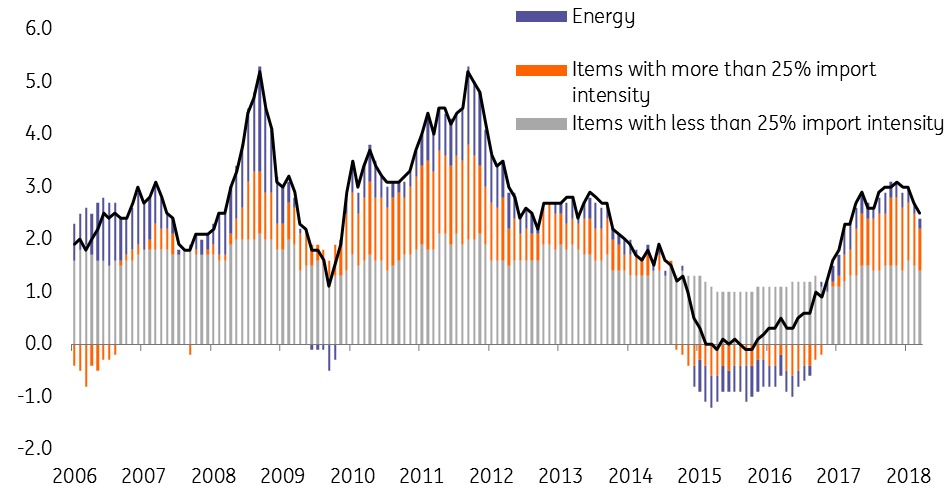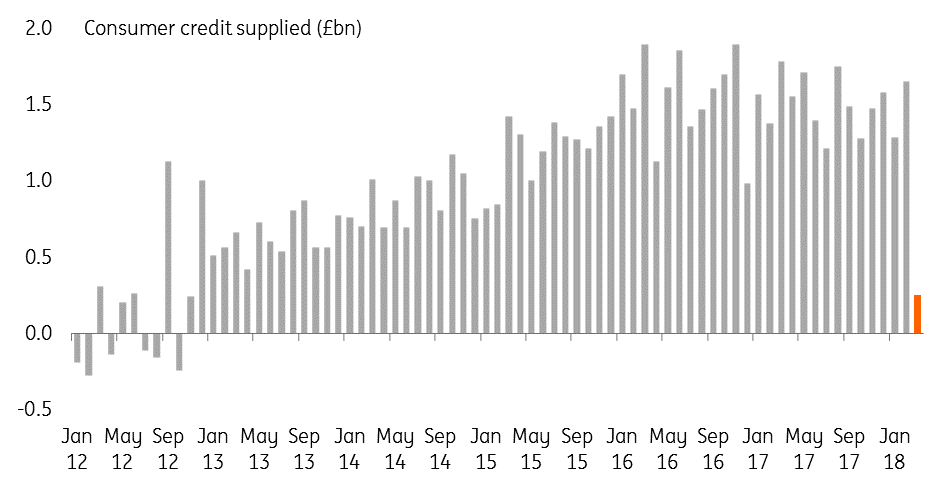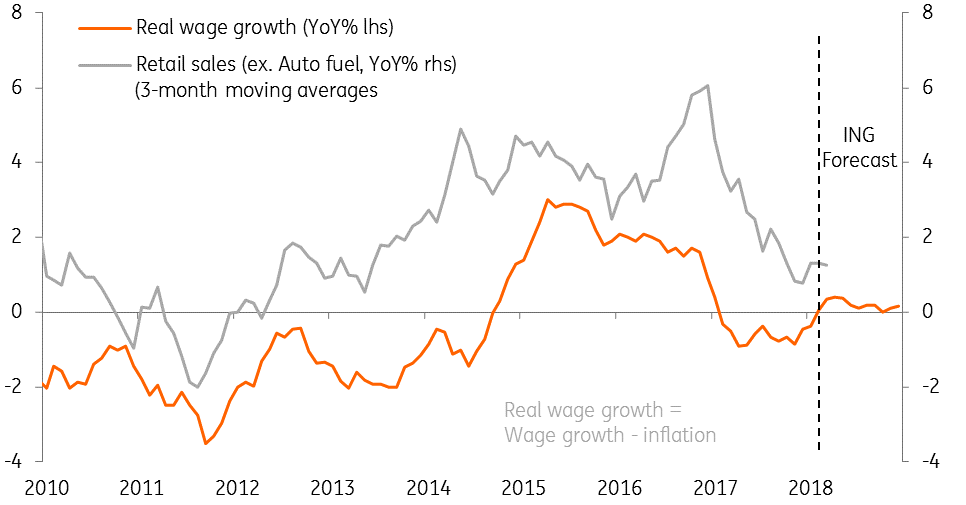The Bank of England’s road to August in six charts
Will the UK economy emerge from the depths of the worst quarter of growth since 2012? That's the question Bank of England officials will be looking to answer between now and the August meeting
Markets may be underestimating rate hike risks - but it all depends on the data
After the May Bank of England meeting (BoE), markets remained unconvinced we'll see a rate hike this year. As we noted at the time, we think this looks like a bit of an overreaction based on what policymakers have been hinting over recent months. With wage growth on the rise, the chances of an August rate hike might be underestimated, and we still narrowly think a rate hike is more likely than not over the summer.
But this is certainly not a done deal. The high street is still having a particularly tough time, and contrary to the Bank’s statement last week, suggests more than just snow prompted at least some of the first quarter lull.
Either way, whatever the Bank decides to do in August will depend heavily on economic data between now and then. With 78 days until the August meeting, here’s a round-up of some of the numbers that policymakers will be keeping an eye on, and how we think they’ll move.
Inflation
Core CPI has fallen quite sharply over the past few months, and we think it could be back at 2% in time for the Bank's August meeting. Prices have largely adjusted to the pound’s post-Brexit fall, and the rate of pass-through is fading. Headline inflation will keep a touch higher by rising fuel costs, but the overall picture of easing consumer price pressure in principle takes some of the heat off policymakers in the near-term.

Wage growth
But where inflation has been more lacking, wage growth has continued to outperform. Pay is now rising at the fastest rate in over two years, and Bank Agents are suggesting that this could be the best year for pay settlements since the crisis. Admittedly it is still early days. A portion of these gains is related to the higher living wage level, while weakness in the first quarter of 2017 has been flattering the year-on-year rates of wage growth. This latter point means we've probably hit a short-term peak in wage growth with base effects set to kick in.
But even so, the momentum remains solid (albeit a little slower than three or four months ago), and we don’t expect the data before August to change policymaker’s minds that the overall direction is upwards. Remember that optimism on wage growth is central to the Bank's rate hike rationale.

Consumer confidence
With wage growth no longer falling short of the cost of living, consumers might have been expected to up their spending plans. So far, this hasn’t been the case.
Confidence has recovered off December’s low but remains depressed, perhaps because real incomes are still hardly rising (even if they are no longer falling). But digging deeper into the numbers reveals that it’s the economic situation, rather than personal finances, that is a great worry to households. Assuming this is related to slower growth and greater economic uncertainty – both of which look set to persist – then we think an imminent recovery in confidence is unlikely.
Borrowing
For some Bank of England rate-setters, we suspect the dramatic fall in borrowing seen in March was a key reason for wanting to remain on hold in May. The sharp slowdown in the amount of consumer credit supplied to just £300m in March coincided with a rapid tightening in credit availability by banks. In one sense, this is a positive development for the BoE, who had been warning about the risks of unsustainable borrowing. But given that much of the consumer spending that has happened over the past couple of years has been debt-driven, a sudden drop-off in lending could see the economy suffer more heavily over coming months.
Admittedly this could all turn out to be a blip – the reasons for the sudden demise remain unclear. But we think policymakers will be paying particularly close attention to this story in the run-up to August.

Growth and spending
Was the first quarter slowdown simply a temporary dip? This is essentially the question that prospects of a summer rate hike depend upon. The BoE’s view is that the decline in growth is unlikely to last, and in fact that the particularly weak GDP figure will probably get revised upwards.
It certainly appears likely that some of the dip was down to the snow. Construction on its own knocked 0.2ppts off first-quarter growth, which is unusually large for a sector that only makes up 6% of the overall economy. Assuming the PMIs and importantly, second quarter growth bounces back, we suspect the Bank may feel comfortable enough to hike rates in August.
That said, a lot still depends on the high street. Pressured real incomes, falling borrowing and depressed confidence, have only added to retailer’s woes over recent months. Shop owners have faced the ‘perfect storm’ of lower demand, higher minimum wage costs and rising business rates, and by some measures, the first quarter was the worst three months since the crisis.
Many retailers have become highly leveraged in the post-crisis years, so if we were to see an increased number of big names entering difficulties over the next couple of months, the Bank might well judge a rate hike to be one headwind too many for the sector.

Brexit
With under six months to go until Brexit talks conclude in October (allowing time to ratify the withdrawal agreement), time is running out. Talks are currently centred on resolving the Irish border conundrum, and so far UK ministers remain divided on which customs model to pursue.
Admittedly, we doubt that the Brexit headlines over the next few weeks will make much of a difference to the odds of a summer rate rise. Having said that, policymakers will be aware that it could get increasingly challenging to hike rates later this year as Brexit noise increases before the UK formally leaves the EU in 2019. Depending on how the economy performs before August, policymakers may want to capitalise while they still can.
The full timeline: What we'll be watching before August
Download
Download article
17 May 2018
In Case You Missed It: Testing times This bundle contains 5 ArticlesThis publication has been prepared by ING solely for information purposes irrespective of a particular user's means, financial situation or investment objectives. The information does not constitute investment recommendation, and nor is it investment, legal or tax advice or an offer or solicitation to purchase or sell any financial instrument. Read more
